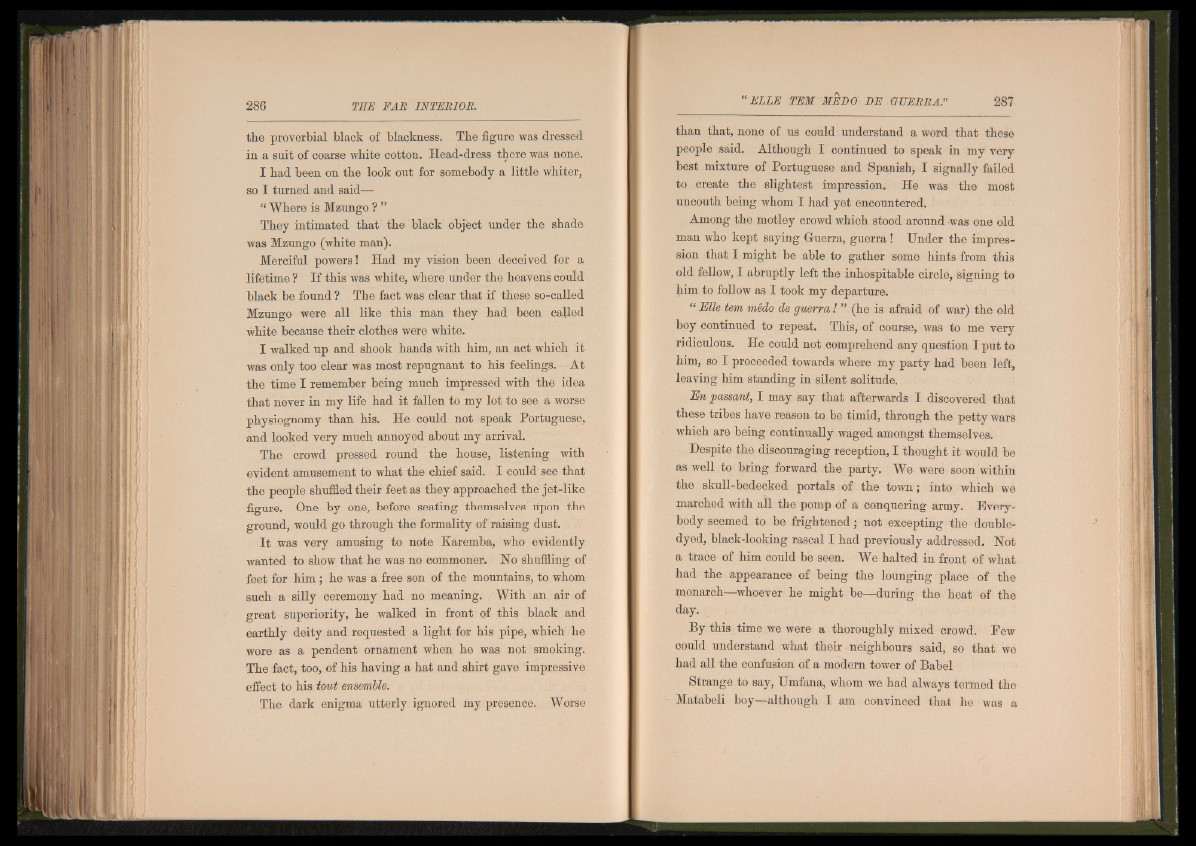
the proverbial black of blackness. The figure was dressed
in a suit of coarse white cotton. Head-dress there was none.
I had been on the look out for somebody a little whiter,
so I turned and said—
“ Where is Mzungo ? ”
They intimated that the black object under the shade
was Mzungo (white man).
Merciful powers! Had my vision been deceived for a
lifetime ? H this was white, where under the heavens could
black be found ? The fact was clear that if these so-called
Mzungo were all like this man they had been called
white because their clothes were white.
I walked up and shook hands with him, an act which it
was only too clear was most repugnant to his feelings. At
the time I remember being much impressed with the idea
that never in my life had it fallen to my lot to see a worse
physiognomy than his. He could not speak Portuguese,
and looked very much annoyed about my arrival.
The crowd pressed round the house, listening with
evident amusement to what the chief said. I could see that
the people shuffled their feet as they approached the jet-like
figure. One by one, before seating themselves upon the
ground, would go through the formality of raising dust.
I t was very amusing to note Karemba, who evidently
wanted to show that he was no commoner. No shuffling of
feet for him ; he was a free son of the mountains, to whom
such a silly ceremony had no meaning. With an air of
great superiority, he walked in front of this black and
earthly deity and requested a light for his pipe, which he
wore as a pendent ornament when he was not smoking.
The fact, too, of his having a hat and shirt gave impressive
effect to his tout ensemble.
The dark enigma utterly ignored my presence. , Worse
than that, none of us could understand a word that these
people said. Although I continued to speak in my very
best mixture of Portuguese and Spanish, I signally failed
to create the slightest impression. He was the most
uncouth being whom I had yet encountered.
Among the motley crowd which stood around was one old
man who kept saying Guerra, guerra! Under the impression
that I might be able to gather some hints from this
old fellow, I abruptly left the inhospitable circle, signing to
him to follow as I took my departure.
“ Elle tern medo de guerra ! ” (he is afraid of war) the old
boy continued to repeat. This, of course, was to me very
ridiculous. He could not comprehend any question I put to
him, so I proceeded towards where my party had been left,
leaving him standing in silent solitude.
En passant, I may say that afterwards I discovered that
these tribes have reason to be timid, through the petty wars
which are being continually waged amongst themselves.
Despite the discouraging reception, I thought it would be
as well to bring forward the party. We were soon within
the skull-bedecked portals of the town; into which we
marched with all the pomp of a conquering army. Everybody
seemed to be frightened; not excepting the double-
dyed, black-looking rascal I had previously addressed. Not
a trace of him could be seen. We halted in front of what
had the appearance of being the lounging place of the
monarch—whoever he might be—during the heat of the
day.
By this time we were a thoroughly mixed crowd. Pew
could understand what their neighbours said, so that we
had all the confusion of a modern tower of Babel
Strange to say, Umfana, whom we had always termed the
Matabeli boy—although I am convinced that he was a